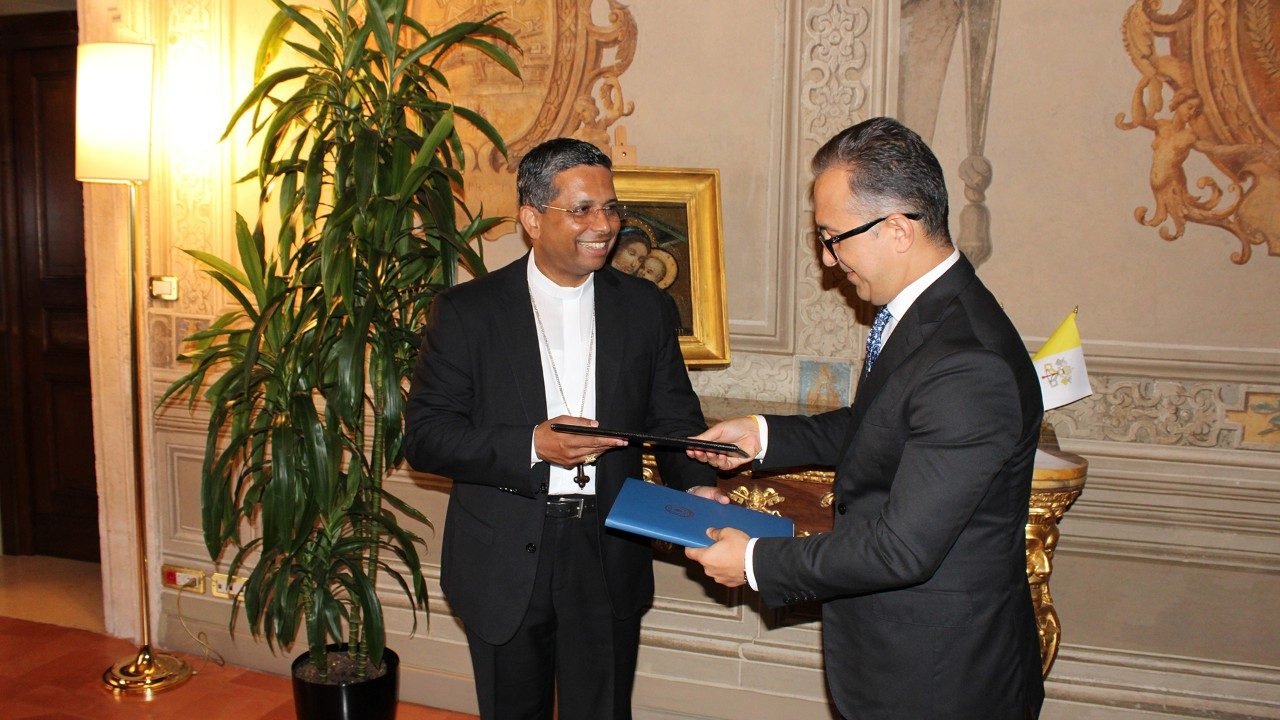
The Holy See and Azerbaijan sign a memorandum to promote cooperation between the Church and the State with regard to interfaith relations.
By Alessandro De Carolis
A long journey, rooted in Vatican II, marked over the years by dialogue and mutual esteem, culminating in the 2011 Bilateral Agreement, and now enriched by a further Memorandum of Understanding on interreligious dialogue.
In his greeting to Azerbaijani authorities present at Monday morning’s ceremony in the Vatican, Cardinal George Koovakad, Prefect of the Dicastery for Interreligious Dialogue, summarized the path followed by the Holy See and the Republic of Azerbaijan to reach the signing of the document regarding a “vital area”—dialogue between different faiths. For the cardinal, this document represents “a clear sign of the shared desire to continue working together for the integral formation of every person, as believers and citizens.”
The Encouragement of the Popes
Moreover, Cardinal Koovakad observed, “in recent decades, the Holy See and the Republic of Azerbaijan have demonstrated a shared desire to develop and strengthen their relations.”
That desire was encouraged, the Cardinal noted, by a series of steps including the Apostolic Journeys to Azerbaijan by Pope Saint John Paul II in 2002 and by Pope Francis in October 2016, as well as Cardinal Secretary of State Tarcisio Bertone’s 2008 visit, in which he expressed the closeness of Pope Benedict XVI.
The Memorandum signed on Friday is based on the April 2011 bilateral agreement between the Holy See and the Republic of Azerbaijan. The Prefect noted that, in addition to consolidating bilateral relations and enabling the Church to carry out its mission in the Caucasian Republic, it has become “a valuable instrument for promoting the principle of religious freedom”, enshrined in Azerbaijan’s own Constitution. This text, he continued, demonstrates “respect for a minority religious community and how Christians and Muslims can live together in harmony”.
Rooted in the teaching of Vatican II
Cardinal Koovakad emphasized the importance Pope Francis placed in recent years on interreligious dialogue, understood as a driving force for a “culture of peace” in the spirit of the Document on Human Fraternity, and even before that, by Vatican II in Nostra aetate, the Council’s Declaration on Religious Freedom, which will celebrate its 60th anniversary next October.
Since 1965, the Cardinal said, “new areas of shared commitment have emerged, such as the desire to care for and protect the environment and the need for an ethical use of artificial intelligence. Concrete gestures of cooperation on such important issues will contribute to the construction of a more peaceful world, a desire that resides in the heart of every man and woman of good will”.
Impulse for Peace
Cardinal Koovakad thanked Azerbaijani President Ilham Aliyev, as well as Ramin Mammadov—the highest state authority for religious associations—“for approving and supporting this important Memorandum”.
He also acknowledged the “constant commitment” of Sheikh ul-Islam Allahshukur Pashazade, president of the Council of Muslims of the Caucasus, who, he recalled, “supported the construction of a new Catholic church in Baku after the destruction of the existing one in the 1930s”.
The cardinal concluded by echoing the words of Leo XIV in his address to the Diplomatic Corps at the beginning of his pontificate, while expressing the hope that the “friendly bilateral relations” between the Holy See and Azerbaijan “will now receive renewed impetus to progress, and be further strengthened as we seek to promote ‘truth, justice, and peace’ for all humanity.”




